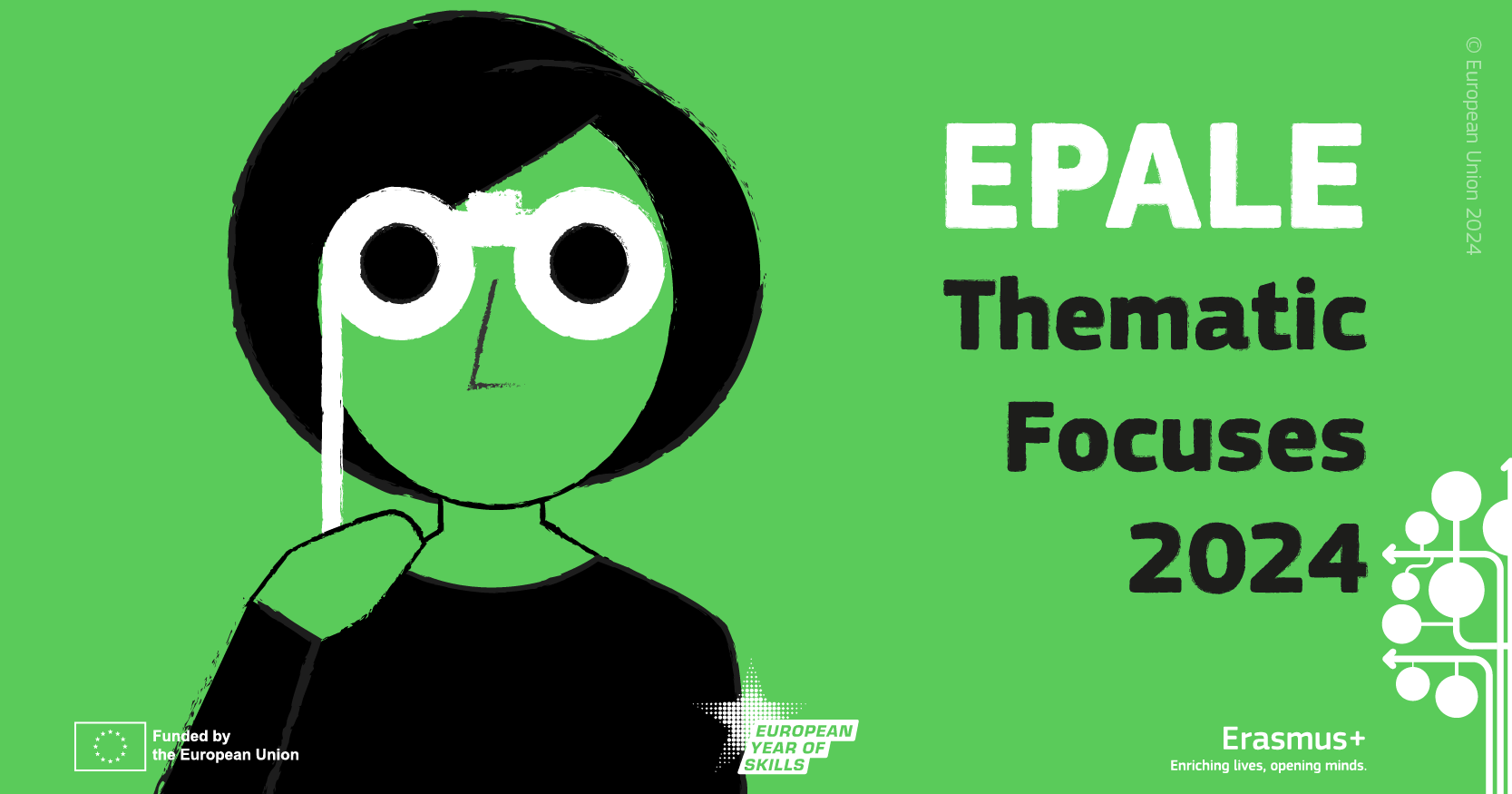EPALE 2024 Thematic Focuses

Always at the forefront of efforts to respond and adapt to societal changes, the last few years have severely challenged education systems and educators all over the world. In 2023, in particular, we experienced a slow recovery and geopolitical tensions, which are likely to continue in 2024.
In this context, and with a strong link with the ongoing European Year of Skills, the 2024 EPALE Thematic Focuses cast a glance at three essential challenges of our current world to help us reflect and build new practices in Adult learning and education.
Let’s take a closer look!

The incredibly fast-paced technological developments of the past few years have affected all aspects of our everyday lives. This pervasiveness can lead to a sense of inevitability and powerlessness towards processes that are often perceived as being too complex to grasp. We need to be protagonists rather than mere spectators of these changes. In this way, we can navigate and - most importantly - shape them. EPALE, in 2024, wants to delve deep into this key issue, particularly exploring how adult educators and learners can retrieve agency and master digital change. We will investigate the importance of equipping adults with a wide range of digital skills, from basic digital literacy to data literacy and algorithm literacy.
One of the priorities of this focus will be women’s empowerment in tech. How can we tackle the underrepresentation of women in ICT professions and STEM education? What are the best practices to ensure that education and training lead to effective and lasting labour market integration of women? How does gender bias affect technology, and what role can adult learning and education play in untangling this?

As the effects of the climate crisis are clear for all to see over Europe and across the world, a renewed awareness leads us to accelerate the green transition in all areas and sectors of society.
Adult learning and training can play a major role in building capacity in this field. On the one hand, developing green skills is crucial as it enables adults to master new green technologies and work processes. While on the other hand, adult learning can support citizens’ capacity to “think and act green” (European Skills Agenda), and become full global citizens, aware of their impact on the environment.
With this focus, EPALE will investigate how the education and training sector can act for a greener, more sustainable future by strengthening the sustainability competences and skills of adult learners. How can we ensure that sustainability and ecological literacy are integrated into adult education programmes and educators’ training? How do we train workforces to develop a green skillset that is aligned with the current challenges? And, most of all, what are the potentialities of adult learning to drive long-term change?

Poverty is a complex, multi-dimensional, phenomenon: its definition goes beyond a mere income-based definition and encompasses other disadvantages, such as disempowerment, vulnerability and discrimination. Reducing inequalities, fighting social exclusion and tackling poverty, thus, are all intertwined efforts that require a joint commitment in promoting equal opportunities for all. Just, fair and equal access to education has direct and indirect impacts on both economic growth and social inclusion. EPALE recognises adult learning and education as a core lever for reducing poverty and tackling inequalities.
With this focus, we will investigate the relationship between poverty and education. How can we tackle the root causes of poor educational performance, including early school leaving, by looking at lifelong learning with a holistic approach? What are the best practices and methodologies to support learners’ empowerment and sense of ownership in educational paths? We will also focus on skills validation as a way of empowering people to unleash their potential and thrive, both in the workplace and society at large.
Comments
Érdekesnek ígérkezik a nők…
Érdekesnek ígérkezik a nők alulreprezentáltságának vizsgálata az IKT-szakmákban és a STEM-oktatásban, valamint a szegénységből való kiút az oktatási lehetőségek számbavételével. Minket az itt a déli régióban különösen érint.
Alignment of Global3CCS with EPALE Themes and Sustainable Develo
Global3CCS, with its focus on innovative and sustainable systems, aligns closely with EPALE’s 2024 themes. Adult education and training in digital and technological skills are key for the digital transition, aligning with Global3CCS’s goal of advanced engineering and sustainable technology training. Additionally, its commitment to the green economy and inclusion of women in technology resonates with the Sustainable Development Goals, particularly in quality education, gender equality, and industrial innovation. This alignment underscores Global3CCS’s importance in contributing to sustainable development and adult education.
@Global3CCSTeam #EPALE2024 #SustainableDevelopment #AdultEducation





ADULT LEARNING AS A LIFELONG ACTIVITY
There is a fourth missing challenge in my view and this is keeping up learning at a later age even after the age of 65. This is crucial for several reasons and should indeed be a core pillar of continuous development. As people live longer and healthier lives, learning doesn't have to stop at retirement; in fact, lifelong learning can offer numerous benefits:
Besides by making adult learning accessible, communities and governments can help create a society that values and supports older individuals. Not only does it contribute to the well-being of seniors, but it also strengthens the community by fostering inclusivity and respect for the wisdom and experience older adults bring.
Incorporating structured opportunities for peer communication within adult learning programs can lead to a more fulfilling and socially connected experience for older adults. Creating spaces for meaningful interactions—whether through group discussions, community projects, or simply informal meetups—ensures that learning becomes not only an individual pursuit but also a collective experience that brings people closer together. This approach contributes to the holistic health and well-being of older adults, enriching their lives in ways that go beyond education alone.